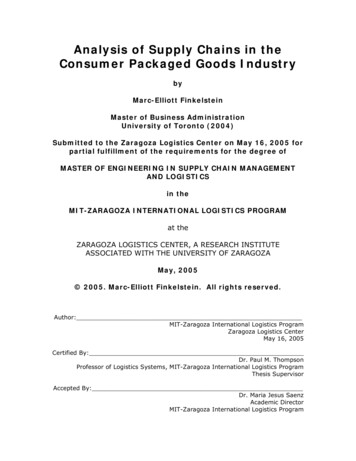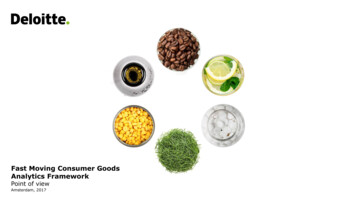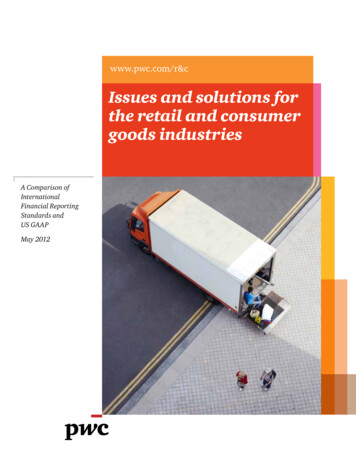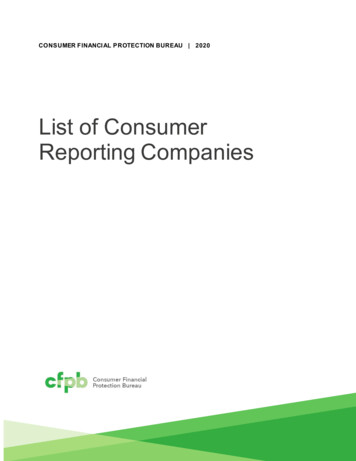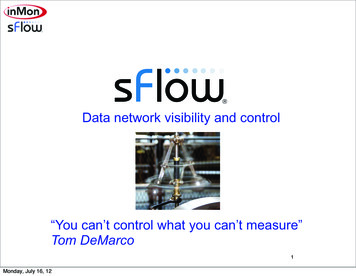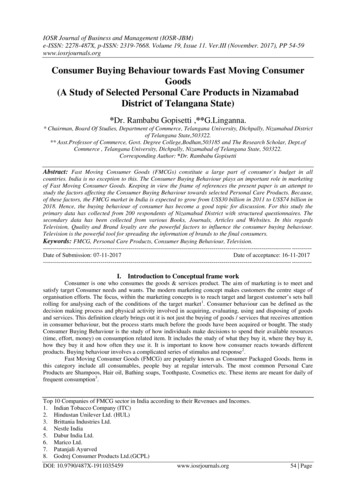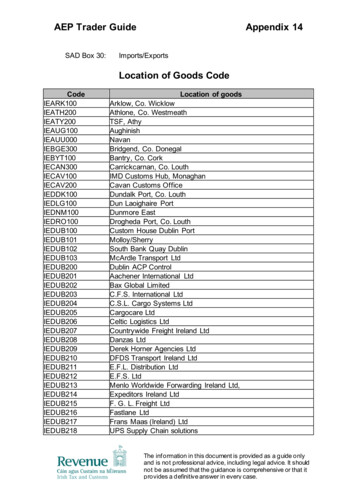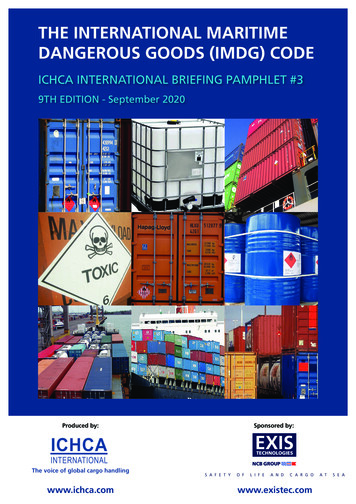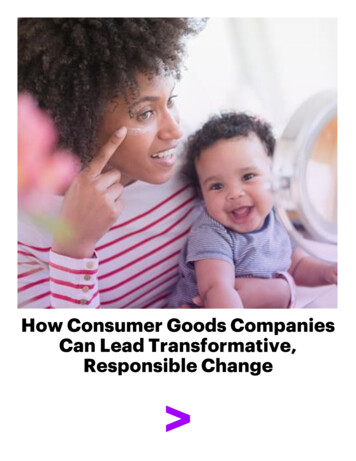
Transcription
How Consumer Goods CompaniesCan Lead Transformative,Responsible Change
The consumer industries are criticallyimportant: This is not vanity. They employone in five workers around the world, andthey shape people’s daily experiencesmore so than many other industries. Fromthe comforting morning cup of coffee ortea, to the products that protect andnourish babies, relieve headaches, andsoothe sore muscles, to clothing,electronics, and so much in between,they are there.That’s why it was no surprise that theseindustries stepped up in the early daysof the COVID-19 pandemic.If these issues remainunaddressed, then any socalled recovery (judged, forexample, on a return to prepandemic spending levels)will be false and likely shortlived. The consumerindustries can—and should—step up to lead this effort.Among other measures, they producedpersonal protective equipment, providedtouchless delivery of goods and services,and introduced stringent sanitationpractices to protect employeesand customers.But much more is needed. The pandemicgreatly exacerbated pre-existing andsystemic global challenges, revealingfault lines and enormous flaws in howsociety treats its most vulnerablepopulations (see “Fault linesand flaws, exposed”).
Fault lines and flaws, exposedCollateral damage from COVID-19, at a dashboard level,includes: The fragility of small and medium-sized businesses: Projectedfailure of 20%–25% of SMBs in 2020—for a total of some 60million businesses.1 A crisis in the informal workforce: Severe impact on theworkers who make up approximately 60% of the globalworkforce, and have minimal employment protection, if any.2 Young people’s economic future at risk: According to theNational Bureau of Economic Research, those graduating into arecession experience losses that can last a decade. Millennialsearn 20% less than their Baby Boomer parents did at the sametime of life.”3 The reversal of almost a decade of economic gains: TheUnited Nations and Oxford University estimated that 490million people across 70 countries could fall into poverty.4 Disproportionate impact on already-vulnerable populations:Some 265 million people projected to suffer acute hunger aswell as exacerbated health and wellness effects due to limitedaccess to care for pre-existing conditions such as obesity,diabetes, addiction, and mental health challenges.5
Individual company action isn’t enough. Onlycollective action will create the solutionsneeded at scale. To create and sustain changeof this magnitude, the consumer industriesmust deploy new and disruptive businessmodels—in concert.They must proactively involve companies, organizations, and agenciesthroughout their business and community ecosystems.They must also involve consumers themselves—by providing solutionsthat consumers can back with confidence through their spending, andby engaging consumers in the design and deployment of thosesolutions.Consumers say responsible consumption is important to them;this sentiment has been widely reported. At the same time, over30% say they don’t makeresponsible buying decisionspurposefully because it is too difficult to assess the effects of theirpurchases—much less compare the options.
5The challenges are daunting.But recently, the path totransformative change hastaken on a more tangible shape.Earlier in 2020, the World EconomicForum introduced a vision and missionto advance its focus areas throughunified action. The Forum’s power asan independent, convening body canalso prove game changing. And digitaltechnologies are providing the means.Business commitment and followthrough are the remaining pieces ofthe puzzle.
Consumers’ views (and changing behaviors)Four trends1Holistic HealthThe vast majority (94%) of consumers in Accenture’songoing consumer research have made at least onehealthy change since the pandemic began—and mostplan to continue this behavior in the future. Thechanges consumers are making indicate a multifaceted definition of health, spanning health-consciousshopping, mental wellbeing and gathering with othersto exercise. Nine out of 10 consumers see health astheir own responsibility (vs. their doctor’s), and, asindividuals take more responsibility for their ownwellness, they are also actively seeking more userfriendly, holistic solutions that they can find in theirown time. Increasingly, they see more companies aspossible contributors to holistic health—and expect aone-stop shop supported by cross-companycoordination and collaboration.2Closer to CommunityFifty-six percent of the survey participants arebuying more from local stores, and 80% of thatgroup plan to continue the practice. Concurrently,56% of consumers are buying more locally-sourcedproducts, and 86% of that group expect to continueto do so. Moreover, these behaviors are on track tocontinue. Consumers increasingly expect to developrelationships with, and share responsibility for, thebusinesses they frequent and the people who workthere.
3Responsible ConsumptionSixty-five percent of consumers expect businessesand governments to “build back better”—sustainably and responsibly. And 63% reported thatthey are personally limiting food waste by planningtheir shopping decisions more carefully and usingup what they purchase. Additionally, even in themidst of severe health and economic stress, 60%are buying sustainable or ethical products, withmost of that group saying that they will continuedoing so.4New (and Lasting) Ways toEngagePeople have increasingly migrated their activitiesonline—and in many cases, engaged in entirely newways of interacting. From doctor appointments, tofitness classes, concerts, and get togethers with familyand friends, experiences are increasingly virtual. Newoccasions—and digitally-powered business models—continue to emerge. And,75% say they will continueonline/virtual interactions after the pandemic.Consumers of all ages have moved up the digitallearning curve; for example, historic ecommerceholdouts permanently doubled the proportion ofproducts they buy online.
A unifying visionfor consumer industriesThe unifying vision articulated by the World Economic Forum and its partnersin the Consumer Industries community and the Future of Consumptionplatform puts the societal interests of humans at its core:are first and foremost human-centric, creating“ Weshared value and operating with integrity toensure a sustainable and resilient future.”Human-centricity, its focal point, meansthat industry actions will be shaped firstby a holistic consideration of humanneeds. Shared value means that actionswill benefit all stakeholders—individuals,business, governing bodies, and theplanet on whose resources they depend.And operating with integrity to ensure asustainable and resilient future aborativeActionsthat all actions will support long-termeconomic viability.The Forum and the consumer industries’community developed this vision andarticulated priorities to bring it to life(see graphic below).Read the full World Economic Forumreport on these recent activities.Improve ConsumerHealth & Well-BeingAdvance SustainableConsumptionAccelerate InclusiveGrowthBuild Trust &TransparencyBetter Nutritionfor AllEnable ResponsibleConsumer ChoiceNew Deal for theWorkforceESG LeadershipOngoing: Upskilling& ReskillingCollaborative PilotOngoing: GlobalSupply SystemDashboard (GSSD)
What’s different nowNew business models and collaborative ecosystemsCompanies have worked on these verycomplex, widespread, and deeply rootedproblems for a long time in one form oranother. What’s different now are theinnovations brought about by the fourthindustrial revolution, which have opened thepossibilities of new capabilities, and new waysin which people, companies, governments,and other entities can collaborate at speed.Used well, these factors can tip the balance infavor of sustainable solutions at scale. Theyhave enabled the disruptive business modelsand the potential for collaboration throughhuman-centric ecosystems that bring suchgoals within reach.For example, circular models can ensure thatproducts and materials are used (and reused) to yield the most possible utility.Inclusive ownership models, by design,propel commercially viable businesses thatalso contribute to the communities in whichthey operate.All these models create significant change,integrating business and societal value whichis amplified by new technologies and anecosystem approach.The imperative for collective action, as illustratedthrough packagingProviding and promoting sustainable packaging is a more complex issuethan meets the eye—and just one example of the urgent need forcollective action. In fact, every element of the value chain mustcontribute to realize a widespread solution. The problem is not justoverreliance on certain types of packaging (company behavior). It is alsoconsumer confusion about which packaging types are more sustainablethan others, and a lack of widespread ability to recycle differentmaterials. Lasting solutions will demand holistic action, includingconsumer education; municipalities investing in—and standardizing—recycling facilities; and product and packaging manufacturers agreeingto use a range of materials that facilities can handle.
Disruptive Business Models open new possibilitiesNew Business ModelsBUSINESS MODELELEMENTSConsumer/ CustomerProduct/ ServiceWho do youtarget?ChannelWhat doyou offer?Revenue ModelHow doesvalue reachthe consumer?How do youcapture value?DISRUPTIVESTRATEGIESAchieve relevance,competitiveness and ingOn-demandIncreasingaccessEnd to endsolutionExperience AsA red ValueChainEMERGENTCOMPONENTSReinvent the solution andmethod of deliverySource: Accenture AnalysisDisruptive ervingOn-demandIncreasingaccessEnd to endsolutionLancôme’s LeTeint Particuliermanufacturescustomizedfoundation at thebeauty counter,based on skinanalysisLoop reduces use ofsingle-use plasticthrough a convenientdirect-to-consumermodel providingbranded products inreusable packaginggoPuff’s on-the-goconvenience storedelivers from localproviders inminutesRural Tao Baointroducesecommerce tosmall villages inChina through localentrepreneurs/guidesIKEA’s purchaseof Task Rabbitenablesconsumers tobuy their IKEAfurniture and getit assembled
Four examples illustratewhat’s possible. Each isaligned to the WorldEconomic Forum’sconsumer industry goals.12Improving consumer healthand well-beingAction:Better nutrition for allAdvance sustainableconsumptionAction: Enablesustainable consumer choiceImperfect Foods is an online social enterpriseselling high-quality produce that either doesn’tmeet store standards (for size or looks) or isconsidered surplus. Imperfect orchestrates anecosystem of more than 200 growers, food bankpartners, and private partners, including Krogersupermarkets, and Feeding America, a nonprofit.In 2018, (the most recent data available) while 20billion lbs. of food went to waste on US farms,Imperfect recovered 1149 million lbs.—selling 325million lbs. and donating 824 million lbs. to foodbanks.6C’est Qui le Patron (Who’s the Boss)?! usesan inclusive business model to ensure thatit creates broad value. In doing so, it alsoillustrates the power of building trust andtransparency. The farmer-members of thisFrench dairy cooperative set thecompany’s overall direction, then engageconsumers in each subsequent phase,e.g., voting to choose new products anddetermine all product specifications,choosing packaging and setting prices. 7
34Accelerate inclusive growthAction: Launch a new workforcedealBuild trust and transparencyAction: Advance Environmental,Social, and Governance (ESG)leadershipThe Forum’s Consumer Industries Taskforceon Future of Work is a collaborative industryeffort to help workers remain productive andemployable in a transforming labor market.Through this initiative, organizations includingWalmart, Unilever, Accenture, and SkyHive aredeveloping a proof-of-concept for howcompanies can best upskill workers to thrivein a digital economy. Learn more.8The city of Amsterdam is musteringcross-sector ESG leadership to avoidwaste and reduce C02 emissions.Amsterdam’s “Circular 2020–2025strategy” aims to halve the use of rawmaterials by 2030, and to create acircular economy by 2050. The city isdeveloping a monitoring tool to track andtrace raw materials and assess whichinitiatives (planned and ongoing) makethe biggest contribution.9
Get started: Three bold steps for CPG businessleaders1Embed ESG goals throughout the company’s strategy.Leaders frequently expect a tradeoff between business results and responsibility;however, Accenture research has shown that doing both can benefit companies.10Change requires “and” thinking, not “or” thinking. Even before the pandemic, the NYUStern’s Center for Sustainable Business had found that products marketed assustainable grew 7.1x faster than “conventional” products. 10 And that number isincreasing, even during the pandemic. Unilever’s Sustainable Living Plan is anexample of how doing the right thing for people and the planet can also do right forbusiness. The company’s purpose-led brands have consistently outgrown the rest ofits portfolio; they have also helped Unilever avoid over one billion euros in costthrough improved water and energy efficiency and waste reduction. 11
on where your organization can have the greatest2 Focusimpact.Responsible activities have varying levels of impact, and the ones that get the mostpublic attention are not always the ones that have the greatest positive impact onsocietal goals. Companies should objectively define the most powerful value levers andalign company efforts against those areas where a company has comparativeadvantage–a real “right to play”.
3 Embrace an ecosystem mindsetThe concept of comparative advantage reinforces why human-centric ecosystems are socritical to success; when the challenges are so complex, no one company can serve everycomponent of a solution. However, this type of collective action is a relatively new way ofoperating for the consumer industries. Traditional barriers include concern about workingwith competitors or not controlling all aspects of a solution; lack of skills and capabilities tosupport collaboration; and existing and emerging laws (including anti-trust and privacyregulations). Developing the collaborative “muscles” needed to effect these changes meansbreaking new ground in data sharing, governance and accountability.This chart from the full World Economic Forum report shows the elements of an effective,human-centric ecosystem.
The challenges facing the CPG industryare complex and far-reaching. As such,they represent an exciting opportunityfor big change—starting now.If CPG executives take to heart thelessons that have emerged over thispast year, the world can be afundamentally and enduringly healthierand better place.
About Accenture’s Consumer ResearchAccenture’s ongoing consumer research program is monitoring the changing attitudes, behaviorsand habits of consumers worldwide as they adapt to a new reality during the COVID-19 pandemic andsubsequent recession, and which of these changes are likely to have a lasting impact. All statistics arefrom this research unless otherwise noted. Learn more about the research findings.Collaboration with the World Economic ForumAccenture and the World Economic Forum Consumer Industries are engaged in a multi-yearcollaboration to explore the future of consumption and the creation of new opportunities for societyand business through the transformative impact of technology and disruptive new business models.During the COVID-19 pandemic, the Forum formed the Consumer Industries Action Group and, withAccenture as the official knowledge partner, convened industry CEOs and leaders to safeguard thefunctioning and resilience of the industry during the crisis and beyond. This initiative galvanizedsupport and broad alignment on an industry mission and vision, highlighted in the Vision Towards aResponsible Future of Consumption: Collaborative action framework for consumer industries. For moreinformation, please contact Zara.Ingilizian@weforum.org or Andrew.Moose@weforum.org.Sources1. Accenture analysis, “Impact of COVID-19 on Our economies and communities” (SMEs at riskdefined as SMEs with less than 20 days of cash to survive COVID-19)2. Ibid.3. “Many Young Americans’ Finances Haven’t Recovered From the Last Recession”, Julia Carpenter,WSJ, June, 2020, 15935186124. “Progress against the multiple dimensions of poverty was made before the pandemic – but now itis at risk”, United Nations Development Programme, July, scentre/news/2020/MPI2020 Progress multipledimensional poverty before pandemic is at risk.html5. Multiple sources: ken; https://www.cdc.gov/pcd/issues/2020/20 0261.htm (link as of Mms2009984 (link as of 21/9/20); nd-substance-use/ (link as of /s00038-020-01383-6 (link as of 21/9/20).6. Imperfect Foods corporate website7. “How millions of French shoppers are rejecting cut-price capitalism”, Jon Henley, The Guardian,December, 2019, chabanne8. “World Economic Forum Jobs Reset Summit: Post-Pandemic Growth Needs New Skills for NewJobs that Are Open to All”, World Economic Forum, October, l/9. “Seeking responsible leadership”, Ellyn Shook and Peter Lacy, Accenture, January ulting/responsible-leadership10. “Latest Research From NYU Stern Center for Sustainable Business and IRI Shows ThatSustainability Is Surviving COVID-19”, NYU Stern Center for Responsible Business, July, iving-COVID11. “Unilever’s purpose-led brands outperform”, November, 2019, Unilever corporate ml perations/
Contact usOliver WrightSenior Managing DirectorGlobal Industry Lead, Consumer Goods & Servicesoliver.wright@accenture.comKaren Fang GrantPrincipal DirectorGlobal Research Lead, Industry reAccenture is a leading global professional services company, providing a broad range ofservices and solutions in strategy, consulting, digital, technology and operations. Combiningunmatched experience and specialized skills across more than 40 industries and all businessfunctions—underpinned by the world’s largest delivery network—Accenture works at theintersection of business and technology to help clients improve their performance and createsustainable value for their stakeholders. With 513,000 people serving clients in more than 120countries, Accenture drives innovation to improve the way the world works and lives.Visit us at www.accenture.comAboutAccenture ResearchAccenture Research shapes trends and creates data driven insights about the most pressingissues global organizations face. Combining the power of innovative research techniques with adeep understa
Collateral damage from COVID-19, at a dashboard level, includes: The fragility of small and medium-sized businesses: Projected failure of 20%–25% of SMBs in 2020—for a total of some 60 million businesses.1 A crisis in the informal workforce: Severe impact o
